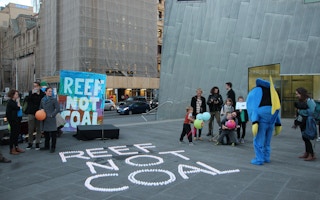The Paris Agreement may not be legally binding, and the United States has just elected a climate denier as president, but despite these developments meaningful progress on climate change is still possible, said journalist and activist Naomi Klein in Sydney on Wednesday.
To continue reading, subscribe to Eco‑Business.
There's something for everyone. We offer a range of subscription plans.
- Access our stories and receive our Insights Weekly newsletter with the free EB Member plan.
- Unlock unlimited access to our content and archive with EB Circle.
- Publish your content with EB Premium.
Speaking at a panel discussion just hours after Donald Trump was elected the 45th president of the United States, Klein urged individuals and communities worldwide not to stop fighting to advance critical issues such as climate change and human rights despite disheartening global developments.
“Just because we don’t have the presidents or prime ministers we want, or the legally binding agreement we need, doesn’t mean we can’t make stuff happen,” Klein, who is the recipient of this year’s Sydney Peace Prize, told the 1000-strong audience at the City Recital Hall.
Even though many have critised the Paris Agreement as ineffective as national pledges are not legally binding, Klein said the agreement is “a powerful tool in the hands of global movements, even though it would be easy to dismiss it as a failure”.
This is because the public commitments underpinning the deal give activists something to hold accountable for, she added.
System collapse
In the aftermath of the US presidential election, it is more critical than ever for campaigners and communities worldwide to keep up pressure on governments and companies to take strong climate action, she said.
The unexpected results of the election are an “expression of system collapse,” said Klein, who has long argued that capitalism and neoliberalism are responsible for the resource exploitation that drives the climate crisis.
The latter refers to the the economic framework where public services are handed over to private sector control, government spending is reduced, free trade reigns, and regulatory oversight of corporate practices is weak.
“The current system cannot deliver the radical change needed for a climate response,” she said, adding that if radical progressives do not fill the vacuum created by crashing neoliberalism, fascism will.
For starters, there needs to be stronger pressure on current US President Barack Obama to take irreversible climate action before he leaves office, said Klein.
Trump has called climate change a hoax perpetuated by the Chinese, recently appointed a climate sceptic to oversee the transition of the Environment Protection Agency and has threatened to withdraw the US from the Paris Agreement, as well as stop contributing to a global climate fund. His election has sparked concerns among climate activists worldwide.
By taking steps such as decommissioning polluting coal power plants, a process that is difficult to backtrack on, Obama can help minimise the damage that Trump can do, noted Klein, who also urged state governments in the US to take the lead on actions such as supporting renewable energy adoption.
“
We have seen the end of the world and decided not to accept it.
Murrawah Johnson, spokesperson, Wangan & Jagalingou Traditional Owners Family Council
Refusal to take responsibility
Commenting on Australia, Klein pointed out that the country is the world’s largest coal exporter, and also among the world’s highest emitters of greenhouse gases.
But despite the widely held view among climate experts that further fossil fuel development will trigger adverse climate change, the Australian government has continued to hand out permits for new coal mines.
Notable among these is Indian conglomerate Adani’s Carmichael coal mine in Queensland; new coal projects such as this signals a weak commitment to climate action, said Klein, adding that by continuuing to approve new coal mines, Australia plays a central role in contributing to climate change.
Given that global warming has been identified as a root cause behind many of the conflicts that are driving the global refugee crisis, the country’s cruel treatment of refugees belies “a culture of refusal to take responsibility for the warming caused by coal mining”, she added.
In addition to refugees, indigenous communities are also adversely affected by climate change, shared Klein. While they are among the most vulnerable groups to a changing climate, they are also at the frontlines of the fight against fossil fuels, and their wisdom is a key source of solutions to the problem, she added.
A high profile example of this is the Sioux communities fighting the Dakota Access Pipeline in the Standing Rock Reservation in the US.
In Australia, the Wangan and Jagalingou people have also been locked in a battle with Adani since 2014, refusing the company’s offers to buy their traditional land.
Murrawah Johnson, spokesperson for the Wangan & Jagalingou Traditional Owners Family Council, said that the community is leading the fight against fossil fuels, but it is also one of the most under-resourced groups to be able to contest the multinational giant.
Urging others in the audience to support activist efforts against fossil fuel, Johnson noted that Adani’s mine would “completely and utterly devastate” the landscape, water systems, culture, and biodiversity of the land.
Referring to the environmental damage that coal mine projects in other parts of the world have caused, Johnson said: “We have seen the end of the world and decided not to accept it.”

















